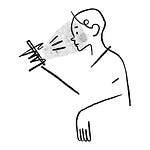These people are the only ones that matter — and keeping this in mind will probably help you keep the right things, the right things.
Plus, Tsh's friend Crystal hops on to share what idea is currently on her Good List.
Tsh’s free weekly email, 5 Quick Things
Mari Andrew on Instagram
Am I There Yet? by Mari Andrew
Parenting with Love & Logic, by Foster Cline & Jim Fay
Flodesk - get it for $19 per month (that's 50% off!)
This is The Good List — I’m Tsh Oxenreider.
This is an idea.
When I was 5, I don’t remember much about what I wanted. I remember starting kindergarten and being the youngest in my class because my birthday is in late August, so I barely made the cut-off date for school. I remember already knowing how to read so I was bored by all the snail’s paced phonics lessons, and I couldn’t understand why my teacher thought I should be held back for another year of kindergarten because I still wrote my Es backwards. I remember rolling my eyes at the Sesame Street record played during nap time, thinking I had moved well past that Muppets oeuvre, and I remember accidentally spilling the little sandbox station in the classroom, causing everyone to groan at me.
But mostly, I remember loving ballet class, wishing my tights were another color besides pink. I remember loving to read and write, spending most of my free time doing both those things, either in my room or outside. I remember meeting Meena in kindergarten, a dear friend who stayed my dear friend all the way through high school, college (even though we went to separate universities for a while), early adulthood when we moved to different countries, and to this day, where we last got together not too long ago for a holiday cookie exchange. And I remember loving my parents and my newborn baby brother, as well as my neighborhood pool and the kids on my block all this was pretty much my world.
If you’re like me, you really don’t remember much about early childhood, except for a few flash memories. But, because five-year-olds generally tend to have a few things in common when it comes to their outlook on life, I’d wager for most of us it’s safe to say this: we were innocent, we were bright-eyed about the future (if we even thought about it), and we liked to play. We were mostly positive about our outlook on life. We liked ourselves. We liked most of the people around us. We were naive to the point of not yet knowing that the world could be hard, mean, or tiring. We might know about boredom, but we also knew how to combat it: with our imaginations, with play, with work, and with rest. We just ...lived our lives. And for most of us, that was enough. That was all we knew. That was great.
Now, fast-forward to today. You might be an outlier for this show’s demographic, but according to stats, you’re probably not yet 85 years old. In fact, you’re probably quite a ways away from that... It’s almost, but not quite, more than halfway to my current age (okay, by a few weeks). It might sound really far away. If you’re like my high school students and think 25 sounds old, then it probably sounds sarcophagus-worthy. My point is: for most of us listening here, 85-years-old is in the future, many of us still decades away. We have absolutely no idea what life will be like for us, both in a global / culture / futuristic sense, but also just in a regular, what-will-my-life-be-like sense. Who knows where we’ll live, what we’ll do with most of our waking hours, who matters most to us by then, what we’ll care about? In fact, for some of us, we won’t even reach 85 — that’s just simple statistics. The average life span in 2019 was 81 for females; 76 for males.
But the one thing that’s true for all of us by that age, is that we’ll be old. 85 is near the end of our earthly lives: we’d see most of our life through the rear-view mirror. Not necessarily saying our best days would be behind us, but most likely our most active, our busiest, our most taxing days. We will have lived the bulk of our lives by then.
So why am I bringing this up? Why am I going on about being 85 years old and being 5 years old? Well, it’s because of a simple illustration that stopped me in my tracks a few years ago, one I still think about all the time. And it’s this episode’s idea.
If you don’t yet follow Mari Andrew on Instagram, you should — I’ve said it before and I’ll say it again, artists who share their work is what makes the Instagram app redeemable, and Mari is no exception. She’s an artist who explores everyday thoughts through her simple illustrations, and what makes her so popular is how universal her art is. Mari always shares vulnerable, personal thoughts that are completely relatable — she basically says things that most of us think and wonder if other people feel the same way. She also shares little tidbits of truth that, when it’s meant for you to pick up and put in your pocket, stop you in your tracks and help you reframe everything.
That was the case for me when I saw this one particular illustration which happens to be the idea in this podcast. It’s a simple drawing of a little girl on the left and an older woman on the right. The header for the little girl says “your 5-year-old self” and the header for the woman says “your 85-year-old self.” The main caption, written above at the top, simply says: “the people worth impressing.”
I’ll get into why I adore this mindset, and what it looks like for me these days, in just a moment, right after this short break. Be right back.
We’re back. So this idea: the people worth impressing are your 5-year-old self and your 85-year-old self… that’s such a simple, but such a mind-blowing idea. At least for me, it is. I think it’s because no matter how we grew up, so many of us end up putting in the backpack we carry through life the desire for approval from those we love. And that’s not a bad thing: when we’re in healthy relationships, it’s normal and okay to want to make your parents proud, to want to make the world a better place for your neighbors and friends, to be someone your partner lights up about whenever he or she talks about you to someone else. We want to please these people. That’s normal.
But it becomes a problem when that becomes our driving force, our main focus, our ultimate decision-maker for things big and small. When we focus more on pleasing other people rather than pleasing ourselves, their opinion of us and our life becomes an idol. And that’s not okay.
Now, many of us perhaps grew up with an idea that putting yourself first, above others, is selfish and wrong. It might even displease God. But I believe this idea is not about doing whatever you want without caring about others, running them over and living however you want, depending on the moment. Well, okay, I suppose that’d be the case for sociopaths, but most of us listening to this podcast are not sociopaths. Most of us want our lives to impact the world around us, big and small, for good. So when we think about pleasing our 5 and 85-year-old selves, of course that comes into play. Those two people: the little girl or boy inside of us, and the old woman or man inside of us, care deeply about us living a life well-lived — and by nature of this meta idea, that includes a life of service, deep, authentic relationships, caring for others, and embodying a selfless posture as we spend time, spend our money, vote, invest in people, and more.
So: prioritizing ourselves with this mindset, unless you’re one of the rare, few people who genuinely doesn’t care about other people, is about as selfless as you can get.
But important to the point I’m making in this episode’s idea: impressing only our young and old versions of ourselves is the epitome of prioritizing the things that matter most to you, knowing yourself well, making wise choices with the long-run in mind, and remembering the core, truest stuff about yourself.
I, for one, think this simple idea of framing your 5-year-old self and your 85-year-old self as the only two people worth impressing, is magic.
So what could this look like in real life? Well, here’s how this idea looks for me these days:
When I think about my little girl self, I think of someone who was confident in who she was without really thinking about it. She was rested in the idea of being loved and being love-able, she loved what she loved without care, and most of her brainspace was delighting in the little things in life. If she thought about the future at all, it was only positive: I wonder what I’ll be like as a grownup? I wonder if I’ll ever be a real-life ballerina? I wonder if I’ll ever write a book?
I think she’d be glad to know I didn’t waste too much time caring about the opinions of others, especially if they don’t even want what’s best for me. She’d be glad to know I was still around, alive and relatively healthy in her 40s (which, of course, is absolutely ancient to a 5-year-old), so she’ll be glad to hear I continue to take care of myself so I can keep sticking around as long as possible. She’ll be glad to know I’ve read a lot of books, and I still do, because stories are my favorite. She’d probably think it was a bit silly if I chose to do things like buy a big house that takes a lot of upkeep or otherwise make certain choices that meant I spent more of my time managing my stuff and the basics of life to the detriment of enjoying my life (such as reading books, or playing).
When I think about my unknown 85-year-old self, I imagine she’d look in the rearview mirror and be really, really glad I invested in and prioritized my kids while they lived in her home, because she knows first-hand how radically fast that goes by. (Side note: I mean, really now — think about it. Our kids live with us what — 18, 20 years? But if we live, let’s say, 85 years? That’s 65 years without them in our home. Our days and years filled to the brim with them are so short, when we zoom out.) My 85-year-old self will probably be glad I didn’t over-concern myself with silly things that seem so trivial from her perspective: whether my jeans look outdated, whether everyone around me is talking about how I look (spoiler alert: they aren’t), my social media follower count, even my particular bank account numbers. She’ll be glad I made time to work out while I’m still able-bodied, making sure I do what I can to keep my bones strong. She’ll be glad I spent time reading books and keeping up with news, and doing things to keep my brain active and engaged. She’ll be glad I stopped to have that conversation instead of walking by; she’ll be glad I had that hard conversation even though I didn’t want to in the moment. She’ll be glad I put up healthy boundaries so that I could prioritize the right things. She’ll be glad that I make the time for regular front porch dates with Kyle so we can talk about life, because who knows how many of those I’ll have. She’ll hopefully be satisfied about my body of work, that I used my gifts to their absolute best on the work that matters most, and not wasted on silly things that just don’t matter or last. She’ll be glad I traveled when I could, I invested our finances when I could, I gave generously, I stopped to just enjoy the little things in life. She’ll be glad I had a dog.
Just for fun, or for a good thought exercise, pull out your journal and jot down a few ways you could impress your 5-year-old self and your 85-year-old self. Because they’re the only ones that matter. And keeping that in mind will probably help you keep the right things, the right things.
Not to long ago, I talked with my friend Crystal Ellefsen. You may remember her from my former podcast, Simple. She was a regular co-host and it was really fun to have a good excuse to catch up with her.
Crystal: What's on my mind is my word of the year for 2020. Do you do that exercise or you have in the past?
Tsh: I have in the past, but I don't force it. Some years I have one, some years I don't.
Crystal: Okay. This is just an exercise that I love, but I have to say I love every kind of reflection and planning exercise possible. This idea that I am taking into 2020 and the word is invest. Hmm. A lot of it is I love words that have multiple layers of meaning for this type of activity. The idea was to really focus on things that have longterm benefits, really thinking about the return on investment in the big picture and how that pertains to some healthy habits not just like how will I feel if I eat too many sweets today, but the big picture of this small choice today is still an investment in my health longterm and my goal of being a healthy grandparent and things like that. But really just thinking about investing in my children, investing in my marriage, investing in myself and my writing, investing in friendships, investing in my home and really thinking about the idea of making deposits and not just…that idea resonates a lot for me right now. One other place that I really got the idea when I was really thinking about deposits was from a parenting book called Love and Logic. I’m not sure if you’ve read it?
Tsh: I love that one.
Crystal: He talks a lot about the importance of making deposits into our children and he uses a particular phrase about you're making deposits in their self-concept. The idea is that you are depositing positive things. Discipline isn't just about correcting, but really thinking about the idea of making deposits in lots of areas of life is what's on my mind. I like how when I think of every different area and I'm thinking about what does it look like in this area to invest to get a return on my investment in the long term and think about how my small choices get me where I want to be. Even if you can only add a dollar to your savings every month, it is still an investment. Even just thinking about things that I am doing for my own writing and my own creativity apart from my actual business, it's helping me to reframe it as I'm investing in myself, I'm investing in my writing. It does not have a short term gain. It doesn't make money now. It doesn’t result in something now. But it is the only way to get where I want to go with writing and with creativity but it's about this long term investment in that part of myself.
Tsh: And not to make it too cheesy, but then if you add on the concept of compound interest, this idea that if it just sits there and doesn't do much but it just keeps building, you more than recoup the costs because it continues to build on itself.
Crystal: Absolutely.
Tsh: I can see that playing out so much, especially in parenting. Like you just said, these little things that you do when they're younger, you reap the benefits later on in life. Even if it's not things you want to instill in a habit sense, but maybe just having a good relationship with them.
Crystal: Absolutely. Even things like teaching small children to do a chore takes forever. On the one hand, teaching them to do it means that hopefully they can slowly learn to do it, but also it really is just also about instilling that value or that connection and things like that. I've also thought about, I know that on The Art of Simple and lots of your work, you talk a lot about friendships and in-person connections and really thinking about friendships as something you have to invest in, right? You can't just wait for oh, I feel social right now. You really do have to sometimes show up when you don't feel like showing up because that's how you invest in those relationships. I know there's all kinds of memes about being introverts and all that kind of stuff, right? But it is so important to invest in longterm friendships and not just I feel like being social or I have a need, but what does it look like to also be present for others and really do the work of maintaining and deepening relationships.
Tsh: It reminds me some of whenever we were living in Turkey and I was working with a therapist for my depression and I made that comment I want to invest in relationships, but where we lived in this big megacity and we didn't have a car, we relied on public transportation. It would take literally two hours to get to a coffee shop just to have coffee for an hour or two with a friend and then two hours back. It felt ridiculous, like a dumb use of my time. I would tell him it's not worth the effort because four hours just to get there for two hours at most of hanging out with a friend, not worth it. And he actually said yes it is, it doesn't feel like it, but it is worth it. It is worth your sanity, your relationships, your friendships, your personhood. It is worth it even if it doesn't feel like it. That's the first thing that came to my mind when you said that.
Crystal: Absolutely. Especially when you are literally spending money into something. I think I've felt that both in spending money on writing workshop or spending money on books or things that I think I have such a mindset of well, if it doesn't make me money, right? If it doesn't, if it's not in my actual business that makes money, it is hard for me to do that. My word of the year last year was generosity and one of my big discoveries was how easy it is for me to be generous with others but not with myself better.
Tsh: That is interesting.
Crystal: In some ways this is also then taking that idea to the next space, to the next level of now it's time for me to be generous with myself and invest in myself and let myself spend money on myself. For example, another way that it's not all just about actual dollars in the bank, right? My husband really wants to do a remodel on our home and his background is in architecture. He loves spaces. This is his art. I’m excited about his vision but there's a part of me that's like, we should just save the money. To spend money creating a beautiful space is a little bit hard for me. And one thing that has helped me is really just thinking about if we really do this, it is about an investment in our home, in our community because we love hosting things. It's money spent. We are smart financially, it wouldn't put us in a bad place, but it is sometimes an investment to spend and not just an investment to save, because you're just investing in something else. The reality is, especially with home stuff, this is an investment in our relationships and creating this space that would be as welcoming to other people. It's so helped me to shift my mind on that and think of spending as another way to invest your money.
Tsh: Another way you're investing with that is for Ken to express his art. You've written about this before where it's important sometimes to create art just for the sake of creating for our souls. This is a great way for him to do that. I would say that's a good investment just for him as a person.
Crystal: Absolutely. A part of me says, yes, but is there a less expensive creative expression? We’ve talked about that when it comes down to different decisions, right? Where there's things where he's like, well, we could do it cheaper this way, but this is my vision for what it could be. There are a lot of decisions were coming to where certainly there are things where we're like, okay, let's save money over there so that we can do it beautifully over here. But we are trying to approach it in a way of this is his creative expression and unfortunately it's more expensive than watercolor, but it is still valuable. I mean just like a sculpture would be valuable, just like someone creating art for art's sake is still valuable except that this will be art that we get to live in and, and so it's different. It's an investment in allowing, just in the same way I'm investing in my creative sides, this also allows him to invest in his creative side.
If you enjoy this podcast, and you don’t yet get my free weekly email — say, you’re listening to this because a friend of yours passed it along — I’m going to encourage you right now to sign up. It’s a short email I send out most Friday mornings, and I have for several years now: it’s called 5 Quick Things, and it’s where I share 5 things I either created or loved from that week. I keep them short and sweet, ideally under a minute to read, because I’m not a big fan of super-long emails that constantly show up in my inbox, so I’m gonna guess you’re not either. Go to fivequickthings.email, and you’ll find where you can sign up. There’s no over-bloated freebie I’m sending you, you know, bait disguised as something fluffy so that you’re mesmerized into getting on my email list. Nope, just short, weekly goodness in your inbox every week, and every once in a blue moon, I may send you an occasional additional letter. I’m here to respect your inbox, because I like it when people do the same with mine. So again, sign up for my free weekly letter at 5quickthings.email, and you’ll get the next one whenever I send it out.
When I hang out online, I’m mostly on twitter @tsh and sometimes on Instagram @tshoxenreider. You can also find a transcript and the show notes of this episode, #8 at thegoodlistshow.com, including how you can follow Mari Andrew on Instagram and where you can find her latest book, called Am I There Yet?. Let’s support good artists so they can keep doing what they do.
And like always — I want to hear from you! Leave a voicemail at (401) 684-GOOD, which goes directly to voicemail; or, record your voice and email the voice file. Just state your name, where you’re from, and what idea, work of art, habit, or thing is making your life just a bit better, and maybe I’ll feature you here on The Good List. For reminders on how to do this, and everything else I’ve talked about, once more, go to thegoodlistshow.com.
Thanks so much to Crystal for sharing her current idea that’s making her Good List. Music for the show is by Kevin MacLeod, and thanks, as always, to Caroline TeSelle for her help, as well as my furry intern, Ginny. I’m Tsh Oxenreider — thanks for listening to The Good List.










You, at 5 & 85